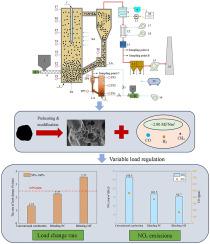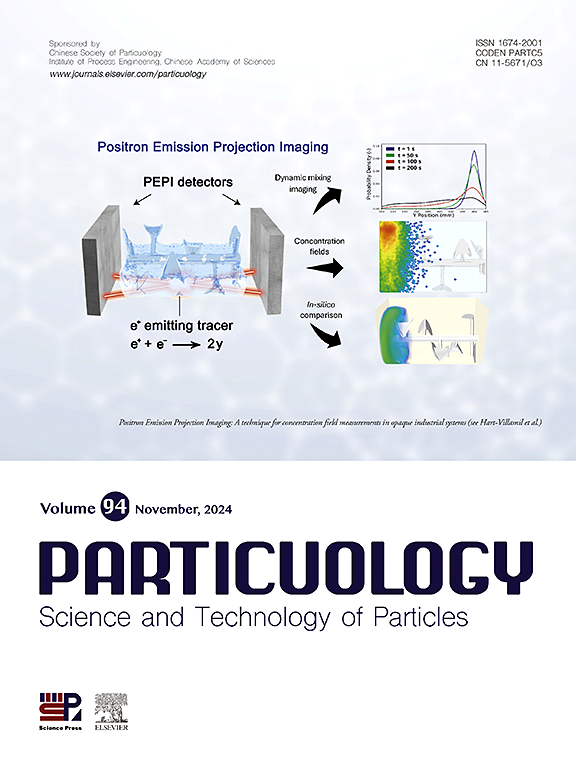Experimental study on variable load regulation of circulating fluidized bed with high temperature preheated activated fuel
IF 4.1
2区 材料科学
Q2 ENGINEERING, CHEMICAL
引用次数: 0
Abstract
The circulating fluidized bed (CFB) boiler is an essential option, serving as a flexible power source. However, it is notable that CFB boilers exhibit noticeable limitations in rapid load changes. This study delved into the impact of fuel characteristics on CFB load change rate, combustion efficiency, and original NOx emissions using a 2 MW CFB experimental platform. The findings revealed that blending pulverized coal or modified fuel positively influenced the improvement of CFB load change rate, with blending modified fuel showing a more significant effect. Blending the modified fuel and pulverized coal increased the load change rate within the 50%–100% range by 164.4% and 57.3%, respectively. Additionally, blending pulverized coal and modified fuel significantly reduced NOx emissions, although there remained room for improvement in combustion efficiency. Compared to conventional combustion, blending pulverized coal and blending modified fuel decreased NOx emissions by 35.9% and 41.4% at 100% load, respectively.

使用高温预热活性燃料的循环流化床变负荷调节试验研究
循环流化床(CFB)锅炉是一种重要的选择,可作为灵活的动力源。然而,值得注意的是,CFB 锅炉在快速负荷变化时表现出明显的局限性。本研究利用 2 兆瓦 CFB 实验平台,深入研究了燃料特性对 CFB 负荷变化率、燃烧效率和氮氧化物原始排放量的影响。研究结果表明,掺入煤粉或改性燃料对提高 CFB 负荷变化率有积极影响,其中掺入改性燃料的影响更为显著。掺入改性燃料和煤粉后,负荷变化率在 50%-100%范围内分别提高了 164.4% 和 57.3%。此外,掺烧煤粉和改性燃料还显著减少了氮氧化物的排放,但燃烧效率仍有待提高。与传统燃烧相比,掺入煤粉和掺入改性燃料在 100%负荷下分别减少了 35.9% 和 41.4% 的氮氧化物排放。
本文章由计算机程序翻译,如有差异,请以英文原文为准。
求助全文
约1分钟内获得全文
求助全文
来源期刊

Particuology
工程技术-材料科学:综合
CiteScore
6.70
自引率
2.90%
发文量
1730
审稿时长
32 days
期刊介绍:
The word ‘particuology’ was coined to parallel the discipline for the science and technology of particles.
Particuology is an interdisciplinary journal that publishes frontier research articles and critical reviews on the discovery, formulation and engineering of particulate materials, processes and systems. It especially welcomes contributions utilising advanced theoretical, modelling and measurement methods to enable the discovery and creation of new particulate materials, and the manufacturing of functional particulate-based products, such as sensors.
Papers are handled by Thematic Editors who oversee contributions from specific subject fields. These fields are classified into: Particle Synthesis and Modification; Particle Characterization and Measurement; Granular Systems and Bulk Solids Technology; Fluidization and Particle-Fluid Systems; Aerosols; and Applications of Particle Technology.
Key topics concerning the creation and processing of particulates include:
-Modelling and simulation of particle formation, collective behaviour of particles and systems for particle production over a broad spectrum of length scales
-Mining of experimental data for particle synthesis and surface properties to facilitate the creation of new materials and processes
-Particle design and preparation including controlled response and sensing functionalities in formation, delivery systems and biological systems, etc.
-Experimental and computational methods for visualization and analysis of particulate system.
These topics are broadly relevant to the production of materials, pharmaceuticals and food, and to the conversion of energy resources to fuels and protection of the environment.
 求助内容:
求助内容: 应助结果提醒方式:
应助结果提醒方式:


